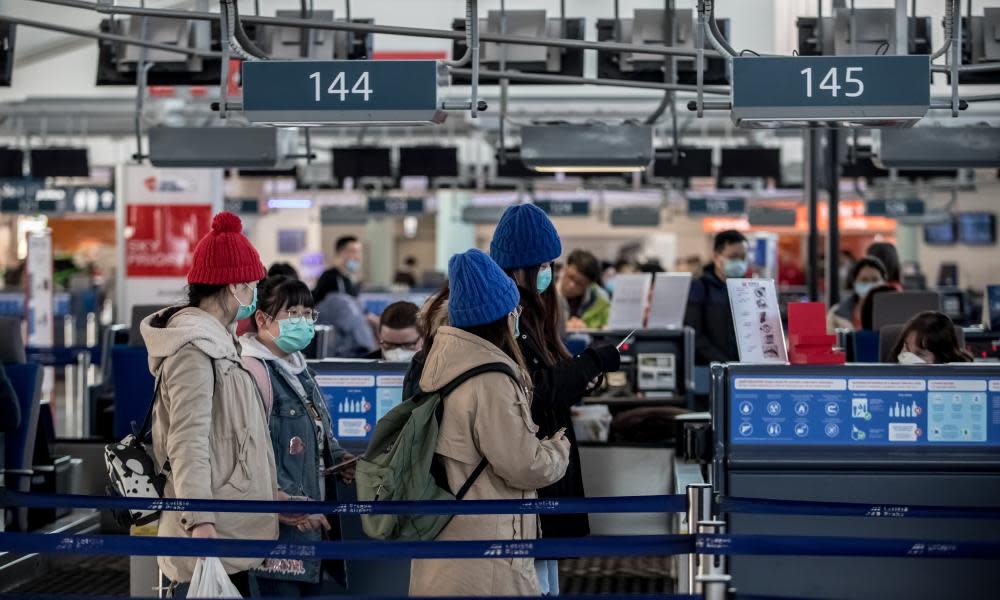Which countries currently have coronavirus travel restrictions in place?

International travellers are facing tighter restrictions at airports as the number of countries denying entry to passengers who have recently visited China, Italy and other regions with reported cases of coronavirus increases.
Related: Coronavirus: man from Diamond Princess cruise first Briton to die from illness – latest updates
Cases of Covid-19 have now been confirmed in 58 countries. Restrictions are becoming more widespread, and major airports are putting preventive measures in place. A document featured on the International Air Transport Association (IATA) website, lists countries where restrictions are in place.
Anyone who has recently travelled to or transited through China (usually within the last 14-28 days)
Complete ban on entry to Australia, Bahamas, many Caribbean islands, India, Indonesia, Japan, Madagascar, Malaysia, New Zealand, the Philippines, Singapore, Turkey, USA and Vietnam, among others.
Anyone who has visited Italy (in the last 14 days)
Complete ban on entry to Aruba, Cook Islands, Fiji, Israel, Jordan, Lebanon, Mauritius, Mongolia, St Lucia and Seychelles, among others.
Passengers travelling from the UK (in the last 21 days)
The only country with a ban on people coming from the UK is the South Pacific island of Nauru (along with travellers from many other European countries and the US), while those coming from the UK face immediate quarantine in the Solomon Islands.
Related: How the coronavirus outbreak is affecting travel in Europe
Overall, European countries have few travel restrictions in place, except Poland, which requires anyone travelling from China, Hong Kong, Italy, Korea or Macao to fill in a health declaration form.
At a press conference on Tuesday at the Ministry of Health in Rome, EU Commissioner for Health, Stella Kyriakides said the commission welcomed “keeping the borders open” across the EU, instead of “resorting to what could be considered disproportionate and inefficient measures”.
Some of the world’s largest and busiest international airports have announced preventive safety measures. Prague has designated separate gates for all passengers arriving from Italy or China. People travelling from those countries also face screening at Bratislava airport in Slovakia. Similar procedures are currently in place in Bosnia-Herzegovina, Serbia, Croatia, Moldova, Bulgaria, Albania and Turkey.
In the UK, airports are acting on the advice of Public Health England (PHE) and have introduced advanced monitoring at airports with direct flights from China. There are also health experts at Heathrow ready to support anyone arriving from China who feels unwell. The current advice from PHE also notes that as “most people who develop symptoms will get them after leaving the airport” the priority is now focused on making sure UK residents and travellers know what to do if they experience symptoms.
Related: What is coronavirus and what should I do if I have symptoms?
The Centers for Disease Control (CDC) in the US has increased screenings at 20 airports, including travellers having their temperature taken and filling out a questionnaire. Anyone with symptoms, such as fever, cough or difficulty breathing has to undergo an additional health assessment. Passengers arriving in the UAE, India, Thailand, Malaysia, Singapore and South Korea will also face screenings, with each country varying in terms of flight origin.
Several airlines have begun adjusting schedules with fewer flights to Italy due to a drop in demand, including WizzAir, BA and easyJet. While other major carriers, such as Cathay Pacific, Delta, American Airlines and United, among others, have drastically reduced the number of flights into mainland China, with many governments around the world now advising against all but essential travel to the country.
New research released last week by IATA found that the coronavirus could cost the aviation industry $29bn in passenger revenues.

 Yahoo News
Yahoo News 
